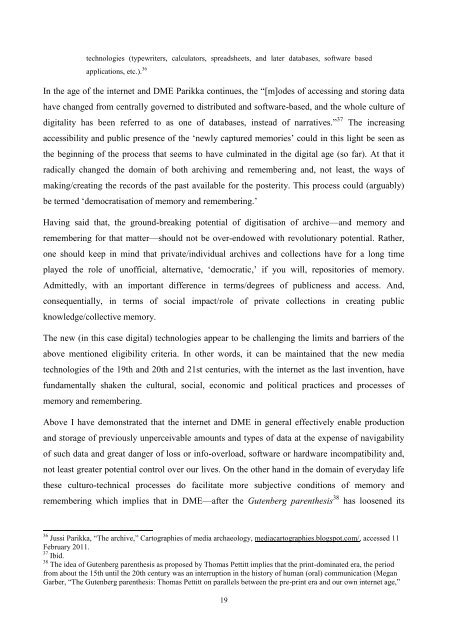UNIVERSITY OF NOVA GORICA GRADUATE SCHOOL ...
UNIVERSITY OF NOVA GORICA GRADUATE SCHOOL ...
UNIVERSITY OF NOVA GORICA GRADUATE SCHOOL ...
You also want an ePaper? Increase the reach of your titles
YUMPU automatically turns print PDFs into web optimized ePapers that Google loves.
technologies (typewriters, calculators, spreadsheets, and later databases, software based<br />
applications, etc.). 36<br />
In the age of the internet and DME Parikka continues, the ―[m]odes of accessing and storing data<br />
have changed from centrally governed to distributed and software-based, and the whole culture of<br />
digitality has been referred to as one of databases, instead of narratives.‖ 37 The increasing<br />
accessibility and public presence of the ‗newly captured memories‘ could in this light be seen as<br />
the beginning of the process that seems to have culminated in the digital age (so far). At that it<br />
radically changed the domain of both archiving and remembering and, not least, the ways of<br />
making/creating the records of the past available for the posterity. This process could (arguably)<br />
be termed ‗democratisation of memory and remembering.‘<br />
Having said that, the ground-breaking potential of digitisation of archive—and memory and<br />
remembering for that matter—should not be over-endowed with revolutionary potential. Rather,<br />
one should keep in mind that private/individual archives and collections have for a long time<br />
played the role of unofficial, alternative, ‗democratic,‘ if you will, repositories of memory.<br />
Admittedly, with an important difference in terms/degrees of publicness and access. And,<br />
consequentially, in terms of social impact/role of private collections in creating public<br />
knowledge/collective memory.<br />
The new (in this case digital) technologies appear to be challenging the limits and barriers of the<br />
above mentioned eligibility criteria. In other words, it can be maintained that the new media<br />
technologies of the 19th and 20th and 21st centuries, with the internet as the last invention, have<br />
fundamentally shaken the cultural, social, economic and political practices and processes of<br />
memory and remembering.<br />
Above I have demonstrated that the internet and DME in general effectively enable production<br />
and storage of previously unperceivable amounts and types of data at the expense of navigability<br />
of such data and great danger of loss or info-overload, software or hardware incompatibility and,<br />
not least greater potential control over our lives. On the other hand in the domain of everyday life<br />
these culturo-technical processes do facilitate more subjective conditions of memory and<br />
remembering which implies that in DME—after the Gutenberg parenthesis 38 has loosened its<br />
36 Jussi Parikka, ―The archive,‖ Cartographies of media archaeology, mediacartographies.blogspot.com/, accessed 11<br />
February 2011.<br />
37 Ibid.<br />
38 The idea of Gutenberg parenthesis as proposed by Thomas Pettitt implies that the print-dominated era, the period<br />
from about the 15th until the 20th century was an interruption in the history of human (oral) communication (Megan<br />
Garber, ―The Gutenberg parenthesis: Thomas Pettitt on parallels between the pre-print era and our own internet age,‖<br />
19

















